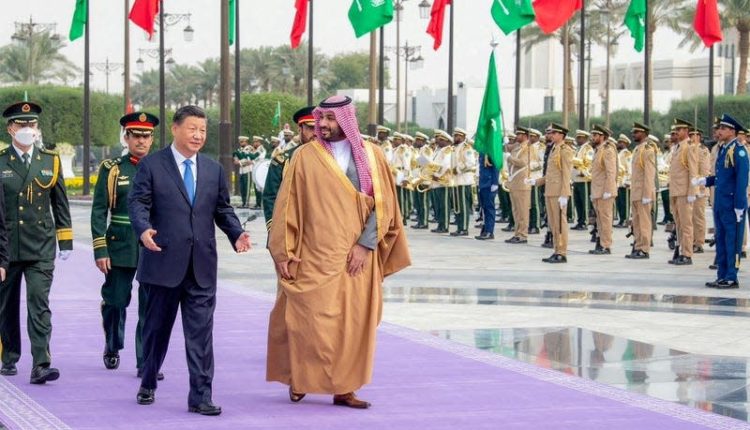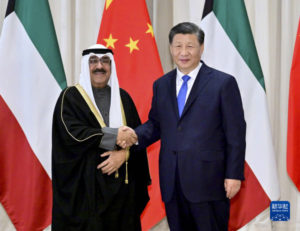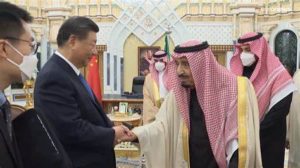Arabs push back versus West; spite US Imperialism
Pres. Xi Jinping receives ‘royal treatment’ during KSA visit

IN what could only be described as the Arabs’ strongest message yet that they are determined to break with US Imperialism and the West, the Kingdom of Saudi Arabia (KSA) spared no effort in welcoming President Xi Jinping of China during his 3-day state visit commencing from December 7, 2022, for the ‘China-Arab Summit.’
As Pres. Xi’s China Air jumbo jet entered the KSA’s air space, several Saudi Air Force fighter jets met and escorted the plane and made a pass-by when it landed while emitting red and yellow plumes, which are the colors of the Chinese flag.
On landing at the King Khalid International Airport in Riyadh, the Chinese entourage was also given a gun salute while members of the Saud royal family headed by Governor of Riyadh Province Prince Faisal bin Bandar Al Saud, Foreign Minister Prince Faisal bin Farhan Al Saud,
at the tarmac to personally welcome the Chinese leader.
It would be Pres. Xi’s second visit to Saudi Arabia since 2016 and his third foreign trip since the COVID-19 pandemic that struck the world 2 years ago.
As if the arrival honors were not enough, the tarmac was also laid not with red carpet, but with purple, the color of royalties.
On the way to the Royal Palace, Pres. Xi’s official vehicle was also escorted by a phalanx of Saudi royalties riding on well-known Arabian horses.
One of the key beneficiaries of the deals made in Riyadh is Huawei, the Chinese tech giant that is on the perennial ‘hit list’ of the United States for threatening the dominance of US and Western tech companies.
Arab school children were also shown singing the Chinese national anthem, further proof that the Saudis prepared carefully to impress Pres. Xi—and send a clear message to the West and US Imperialism that the kingdom and the rest of the Arab world is taking an independent stand in their dealings with China.
American puppets in the Middle East no more
The lavish welcome ceremony cannot compare to the “staid” and “ordinary” ceremony that the Saudis have accorded to other visiting heads of state, including US President Joe Biden who visited the kingdom last July.
But whereas Biden utterly failed to get any concession from the Saudis, particularly in increasing the Saudis’ oil output to help stabilize global crude prices and in joining the West in sanctioning Russia for its preemptive strike against Ukraine last February, President Xi capped his visit with several major infrastructure and trade agreements initially worth over $30 billion.
(Instead of boosting oil production, the OPEC—Organization of Petroleum Exporting Countries—announced last October 5, 2022, that it is instead reducing its daily oil output by 2 million barrels a day. The oil cartel is largely dominated by Saudi Arabia).
(Saudi Arabia is also wishy-washy in the US call for sanctions against Russia by doubling its import of Russian oil from 320,000 metric tons in 2021 to 647,000 metric tons for the second quarter of 2022, even as the conflict in Ukraine rages).
Official Saudi state media said Chinese and Saudi firms have already signed 34 deals for investment in green energy, information technology, cloud services, transport, construction, and other sectors.

-President Xi Jinping, with Crown Prince of Kuwait Sheikh Mishal Al-Ahmad Al-Jaber Al-Sabah, who is among the many heads of state the Chinese leader meet during his visit to Saudi Arabia (photo from post of Chinese Foreign Ministry Spokesman Wang Wenbin).
As a further message to the US that the Saudis are no longer its ‘pushover’ factotum in the Middle East when it comes to trade and economic development, one of the key beneficiaries of the deals made in Riyadh is Huawei, the Chinese tech giant that is on the perennial ‘hit list’ of the United States for threatening the dominance of US and Western tech companies.
Huawei, reports from the visit said, signed an MoU (memorandum of understanding) with the kingdom on cloud computing and building high-tech complexes in Saudi cities.
Aside from meeting with Saudi Crown Prince Mohammed Bin Salman and King Salman bin Abdulaziz al Saud, Pres. Xi also met with all the Arab leaders comprising the Gulf Cooperation Council (GCC) chaired by the Crown Prince.
A statement from official Chinese media said Pres. Xi was also scheduled to meet Qatar’s emir, Kuwait’s crown prince and the presidents of Egypt, Tunisia, Djibouti, Somalia and Mauritania alongside leaders and prime ministers of Iraq, Morocco, Algeria, Sudan and Lebanon.
The Chinese leader also held bilateral talks with Kuwait Crown Prince Sheikh Meshal al-Sabah, Egyptian president Abdel Fattah al-Sisi, Iraqi prime minister Shia al-Sudani, Sudanese leader general Abdel Fattah al-Burhan and Palestine president Mahmoud Abbas.
The history of trade between China and the Arabs is a long one, dating back to the era of the Silk Road, during the Han Dynasty and Saudi Arabia today remains as China’s biggest supplier of oil and its biggest trading partner.
Official Chinese data showed that in 2021, bilateral trade between the two countries reached $87.3 billion, a 30 percent jump from the previous year.
Much of the trade was focused on oil. China’s crude imports from Saudi Arabia stood at $43.9 billion in 2021, accounting for 77 percent, or nearly 25 percent of its total goods imports from the kingdom, a report from CNN posted last December 9, 2022, disclosed.

But what is really worrying US Imperialism is the decision of the Saudis to agree with China’s proposal that some of its oil purchases would be denominated not in dollars but, in yuan, the Chinese currency, or gold, effectively helping in the devaluation of the US dollar as an international reserve currency.
The so-called “petrodollar” whereby all oil purchases from the Middle East must be bought using the US dollar is one the strengths of the US currency.
And US effort to mend ties with the Saudis appeared ineffective.
On December 6, 2022, a day before Pres. Xi arrived in Saudi Arabia, the US announced that a local court in Washington has dropped the murder charge against Crown Prince Mohammed bin Salman for the October 2, 2018, killing of journalist Jamal Khashoggi inside the Saudi Consulate in Turkey.
The US government suddenly claimed that the Crown Prince cannot be prosecuted for the killing of Khashoggi as he is considered a “head of state” and is therefore covered by the “head of state immunity” the US selectively gives to its so-called “allies.”
The US retreat in the prosecution of the Crown Prince shows not only the duplicity and hypocrisy of the Us-promoted ‘rules-based order,’ but also came despite Biden, during the US presidential campaign, promised that he would made “accountable” and bring to justice those responsible for the killing of Khashoggi, primarily the Crown Prince.
But as the magnitude of the success of Pres. Xi’s visit to Saudi Arabia has shown, the US message has been clearly lost in translation.


